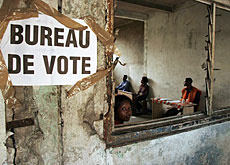
Radio station advocates free elections in Congo

July 30 looks set to become an historic date for the Democratic Republic of Congo when the central African state holds its first free elections in more than 40 years, thanks in part to a Swiss contribution.
Despite years of violence and misery, an estimated 25 million Congolese will go to the polls to elect a new president and a parliament on Sunday.
It is a long-awaited moment for a country which has suffered years of armed conflict and the rule of the late dictator, Mobutu Sese Seko.
If the former Zaire – an erstwhile colony of Belgium – can now hope for a better future, this is also due to the Swiss-based Hirondelle Foundation.
Convinced of the importance of free information in the democratisation process, the organisation launched Radio Okapi in a bid to provide the most effective tool for ensuring that the election runs smoothly.
Educating the voters
The radio station operated by Hirondelle and the United Nations has devoted considerable time to the landmark event.
“By broadcasting topical news, in-depth reports and debates, we have contributed to educating the population,” Etienne Rougerie, deputy editor-in-chief of Okapi, told swissinfo.
Both the voters and the candidates – who were invited to express their opinions in the Kinshasa studio – have benefited, according to Rougerie.
In accepting the content of the polling card edited by Okapi, they expressed their ideas in accordance with the basic principles of journalism, he said.
Information was also re-broadcast by other stations in the country and, Okapi was named best radio station in a survey on educating the Congolese electorate.
Many languages
The challenge taken up by Okapi in 2002 was anything but easy. The aim is to convey the same information over an area as large as western Europe.
It is an impossible task for the other national broadcasters which do not enjoy the logistics support of Monuc, the UN Mission in the Democratic Republic of Congo.
“We have eight regional stations, and each discussion is translated into French and the four national languages,” states Yves Laplume, the director of Okapi.
Providing information to voters in the provinces was particularly important. Okapi was the only source to obtain objective, credible information.
Experts in dialogue
Switzerland has been concerned about the situation in the Democratic Republic of Congo for a number of years.
“From 1998 to 2000, Switzerland supported a programme of dialogue training for representatives of civil society, the political opposition, the business community and the authorities,” foreign ministry spokesman Lars Knuchel told swissinfo.
The ministry also provided two experts to promote peace negotiations between the government and rebel groups, while the Catholic Church charity, Lenten Fund, has been involved in numerous training projects.
Since August 2005, the Swiss authorities have contributed SFr1.6 million ($1.3 million) to the electoral process.
For his part, the Swiss ambassador to Kinshasa, Hans-Rudolf Hodel, hopes that the elections will run smoothly.
“Here in Congo there is enormous potential. If the elections bring about greater stability, this will open up new investment opportunities also for Swiss firms,” he says optimistically.
Switzerland has sent five observers to Congo to help ensure a fair election.
swissinfo, Luigi Jorio in Kinshasa
On July 30, voters in Congo will go the polls in the first round of presidential and legislative elections.
There are about 30 candidates for the presidency, including four women.
Around 9,500 candidates from 240 political parties are in the running for the 500 seats in parliament.
Switzerland has contributed SFr1.6 million to the electoral process.
Congo was a Belgian colony until 1960.
After gaining independence, the first and only democratic elections were held. Patrice Lumumba was elected as head of state but was assassinated seven months later.
In 1965, General Mobutu Sese Seko came to power in a coup. He renamed the country Zaire in 1971.
After decades of dictatorship, Mobutu was ousted by the alliance under Laurent-Désiré Kabila who proclaimed himself president of the Democratic Republic of Congo in 1997.
When he died in 2001 he was succeeded by his son, Joseph Kabila, who is currently head of the transitional government.
Between 1996 and 2003 the country was the arena of two armed conflicts resulting in 3.8 million deaths.

In compliance with the JTI standards
More: SWI swissinfo.ch certified by the Journalism Trust Initiative



























You can find an overview of ongoing debates with our journalists here . Please join us!
If you want to start a conversation about a topic raised in this article or want to report factual errors, email us at english@swissinfo.ch.